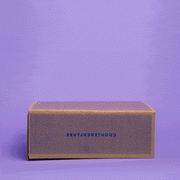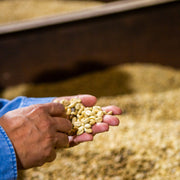As summer approaches in the United States, our coffee menu is filling out with our first Northern Hemisphere coffees of the year. Bright, outstanding coffees from countries like Ethiopia and Kenya return to the menu, while we receive a vast array of coffees hailing from Central America and the northern edge of South America. Below the Equator, many countries are gearing up for harvest. From Peru to Papua New Guinea, we look forward to seeing the bounty of those Southern Hemisphere harvests.

Now Roasting
The start of summer ushers in a hemispheric shift for our menu. In June, our single-origin menu shifts primarily to Northern Hemisphere coffees, starting with coffees from countries relatively close to the equator.
Uganda ushers in our menu’s coffees from African countries north of the Equator. Our Producer-Partners at Kawacom brought back Kabeywa, with a washed and natural-sundried version of the coffee. Exporting group Mountain Harvest also supplied us with single-origin releases like Sipi, the subscriber-exclusive Makali, and a soon-to-be-released peaberry lot!
Our first coffees from Ethiopia have arrived, with the staff-favorite Idido making its debut. You can read more about the Ethiopian coffees that are on their way in the “In Transit” section below.

Across the Atlantic, we’re exploring several new coffees from northern Colombia in Gradient. A burgeoning group in Cauca, a cooperative from the Sierra Nevada range, and an estate in northern Huila will make their way into this Year-Round blend.
We’re also proudly featuring La Golondrina from Timbio in Cauca. We’ve purchased this coffee from the Organica cooperative since 2005.
Coffee from Costa Rica is making its way into Big Trouble. We purchased a small amount to explore its potential for our menu, and we hope to widen our approach in this country.
Mexico coffees are also returning to Big Trouble. Our West Coast wholesale business is enjoying a single-origin release from the country: Familia Cifuentes Mayan Harvest. A few more coffees from Mexico will arrive in the coming months.
Finca La Victoria recently hit the menu, representing our first coffee from Nicaragua. We have a few more releases on the way from this Central American country.
The beloved Finca El Puente returns as our first coffee from Honduras, with a 100% Catuai-variety single-origin release and as a Big Trouble blend component. Several of our marketing team members visited Finca El Puente earlier this year at the end of the harvest cycle and have been thrilled to enjoy this year’s roast of their coffee. We plan to release several small, single-variety lots from Finca El Puente in the coming months.
More coffee is on its way from Honduras. You can read more about it in the next section!
In Transit

Further north of the Equator, harvest has concluded for many countries. These coffees are in the process of being milled, exported, and shipped.
Across Central America, coffees are being loaded into shipping containers and hitting the open ocean, destined for ports in the United States.
While some coffee from Mexico is already on the menu, we’re approving lots from southern Oaxaca that will comprise our Rio de Abejas release. Some of these coffees will also make their way into Big Trouble.
We received our first container from Guatemala in early May, hailing from the CODECH cooperative. We contract large volumes of coffee from this group, slotting them into several Year-Round blends while highlighting our favorite micro-lots, such as Concepción Huista and a single-farm lot from Juana Escobar Gaspar.
Honduran coffees from Finca Pashapa will ship soon, arriving on our menu in the coming months as a dark roast and a single-variety Bourbon release.
Out of Nicaragua, Finca Aurora will return for Big Trouble blend components, as well as a special release of an anaerobically fermented single-variety lot. Cinco de Junio is also slated for another year as a single-origin release.
The famed Finca Nuguo—an award-winning farm in Panama that exclusively grows Gesha—recently arrived in Durham. This year, we doubled down on this coffee from Jose Gallardo, purchasing three lots to blend and release in the coming months.
While African harvests wrapped up earlier than in Central America, these coffees take longer to arrive in the United States due to the shipping involved. No need for concern: these stunning coffees stay vibrant as they cross the ocean.
While Idido has already debuted, several more coffees from Ethiopia are en route.
Former Jabanto members from the Biloya area have formed a group known as Malabu, after the word for honey in the local Gedefa language. This year, all washed Ethiopian coffee for Year-Round blends came from Biloya, where the group has built some relatively large washing stations in the past three years. Group members in Yirgacheffe will keep the Jabanto moniker. Expect the return of Jabanto Natural-Sundried, as well as an outstanding washed lot from Jabanto member Sharbo Maro.
You can also expect to see coffees like Okolu Natural-Sundried and Geremew Dambi Natural-Sundried.
Across Ethiopia’s southern border, producers in Kenya have either exported their coffees or have them staged for export. We’re excited to see an array of coffees from the Kushikamana farmer’s group, including a new single-farm release called Muthonjo. This will accompany releases from other Kushikamana members like Faith Estates, Kamavindi, and Ngarutua. We also expect to see the return of the wonderful Guchienda.
Across the Gulf of Aden from the Horn of Africa, our Producer-Partner in Yemen faced a difficult year. We expect to see a delicious lot of natural-sundried coffee from Hassan Asalol, but we will have a smaller volume due to lower yields. While we typically purchase 80–100 kilograms of Hassan’s coffee, we could only purchase 25 this year due to challenging climatic conditions.
Now Harvesting

South of the equator, several countries we source coffee from are picking their 2023 harvests.
Harvest is underway across Africa’s Great Lakes region. In the Democratic Republic of Congo, the Muungano cooperative is harvesting coffee that comprises Buchiro. This is our seventh harvest cycle buying Buchiro, and it will be our second year purchasing a lot of natural-sundried coffee from Muungano.
The same communities that produce Buchiro have faced devastating flooding events this Spring. Some Muungano members lost family in the event due to destruction in neighboring communities. Our team is in contact with the cooperative manager to assess how we may best provide support.
We expect to receive fresh harvest samples from the small, neighboring countries of Rwanda and Burundi in late June.
We’re looking forward to tasting this year’s harvests of Intango and Buliza from Rwanda, along with the washed Mpemba and Mpemba Natural-Sundried from Burundi.
In northern Peru, lower-elevation areas recently started their harvests. Higher elevations will follow suit in the coming weeks, with harvest wrapping up in late Summer. Working with our partners at CENFROCAFE and Origin Coffee Lab, we plan to reprise coffees like La Hierba Santa, La Viuda, and Valle del Santuario. We also look forward to reprising single-farm lots from Damian Espinoza and Lucio Luque.
Thousands of miles to the west, on the other edge of the Pacific, coffee picking is underway in Papua New Guinea. Alex plans to visit our partners at the Colbran estate in late June to dive into sourcing for coffees like Baroida, Morita, and a single-farm lot from Boka.
In the Forecast

Coffee harvests will begin soon in equatorial regions like southern Colombia and Ecuador.
In Colombia, we’ve finalized contracts with Toldopamba and the Borderlands groups, securing another year for coffees like Cueva de los Llanos, K’uychi, Nuevo Amanecer, Santafé, and Urcunina. We expect these coffees to start shipping in July.
We plan to purchase coffee from Ecuador again this year, bringing back Los Charapanos, coffee from Eladio Chamba, and potentially adding a new offering to the menu.





